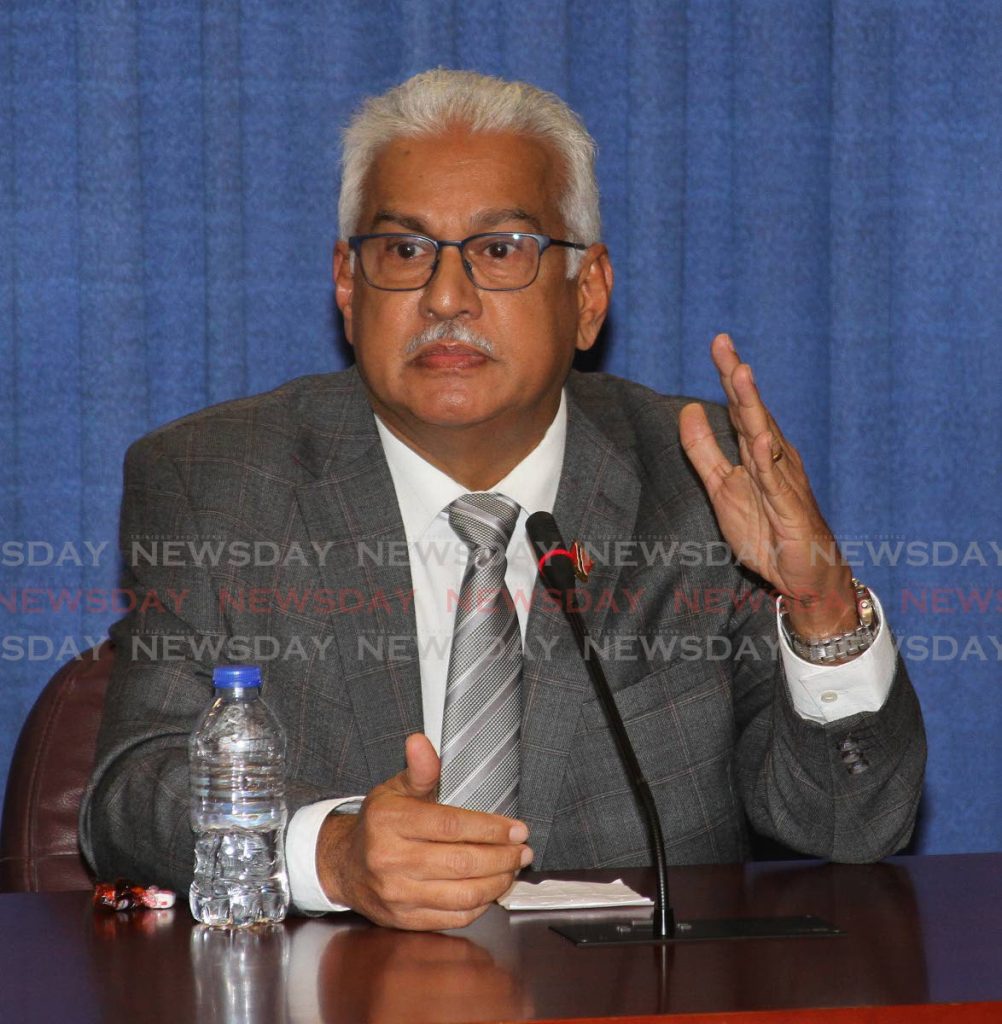Covid19 alarm bells: 46 new cases, 3 more deaths

A DAY after Minister of Health Terrence Deyalsingh cautioned the public not to relax on covid19 public health regulations, came the sobering news on Thursday that 46 new cases had been reported with three additional deaths.
At a press conference hosted by his ministry, Deyalsingh again warned citizens against complacency especially going into the long Easter weekend.
“Three of our people; three more families in Trinidad and Tobago have been plunged into mourning,” he said. “Only these families know what it is like to lose (a family member) to covid19.” He said TT has decreased its vigilance. “We seem to be thinking we have beaten the virus. We have not!”
He said deaths will continue to increase and more families will suffer without action. “If we extrapolate those numbers into the future without doing something now, the situation will become something untenable. Cases will mount in the hundreds.”
Deyalsingh said after consulting with Chief Medical Officer Roshan Parasram and Minister of National Security Stuart Young, he (Deyalsingh) was given authorisation by the Prime Minister to roll back on recreational sports.
He said that as of Good Friday, recreational team sports, limited to congregations of no more that 22 athletes, conducted both indoors and outdoors will be discontinued.
“People engaging in these sports, it is more than 22 people. The after-game lime is becoming dangerous and people are congregating without wearing masks, so we are going back to how things were.”
Speaking also at the press conference, Dr Parasram said the regulation to allow for recreational sports, which was given the green light in early March, has been highlighted as it represents a significant change in numbers. “We noted (numbers) steadily began to rise two weeks after that regulation (came into effect).”
He said the current numbers are similar to where TT was in September. He said there are a large number of people in savannahs and community grounds participating in sporting activities without face masks or shields and in close proximity to each other. “That has been shown to be the nidus (focus of infection) of the spread in TT and everywhere else in the world.
“All things being equal, it seems to be a driver of the spread of the virus.” Parasram said there are other factors, including complacency which also drives the infection rate. “It is no one thing in the population causing the increase in cases (but) it seems to be a relaxation in guidelines.”
Deyalsingh said no other rollback has been implemented at this time. “You are free to come and go, but we are urging caution. We need to go back to the discipline we had in October, November, December, (and) January…especially as we go into this Easter weekend.
“We want people to have a safe, holy, happy Easter but we are asking them not to congregate. Go to the beaches but be careful.” He also discouraged big gatherings at home or in public.
Deyalsingh also addressed how the vaccines were paid for at the press conference. He said the first tranche of 33,600 vaccines cost US$148,084.06.
“That money was paid under the Inter-American Development Bank (IDB) on a loan agreement programme which Cabinet signed on to in 2016. It’s not a grant.” He said the IDB did not pay the money. It is a loan the government and people will eventually have to repay. He said each dose costs US$4.41, inclusive of insurance, shipping and other associated costs.
“These vaccines are being paid for by the people utilising a loan from 2016.” He said the IDB loan was taken out then to be used for purposes such as this.
“We would have gone to Cabinet under the Ministry of Urban Development to re-purpose a part of the loan to do that, so this was done all under Cabinet approval.
“It was a quick way to get the money to Covax. If we had not paid in a particular time frame, the shipment of vaccines would have been delayed.” Phase one of vaccinations begin on Tuesday with front-line healthcare workers and people over 60 with Non-Communicable Diseases (NCDs).
Deyalsingh said 6,621 front-line workers will be vaccinated, which represents an estimated 30 percent of the roughly 17,000 healthcare worker population, spanning 11 categories of workers. He said the ministry is targeting 40,950 NCD patients.
He said although the number of vaccines currently available will not cover all of the NCD patients, the remainder will be accommodated when the second tranche of vaccines arrive before phase two begins. He said appointments can be made at clinics and NCD patients over 60 who are not registered with a clinic can call one of the 21 vaccination centres to make an appointment.


Comments
"Covid19 alarm bells: 46 new cases, 3 more deaths"